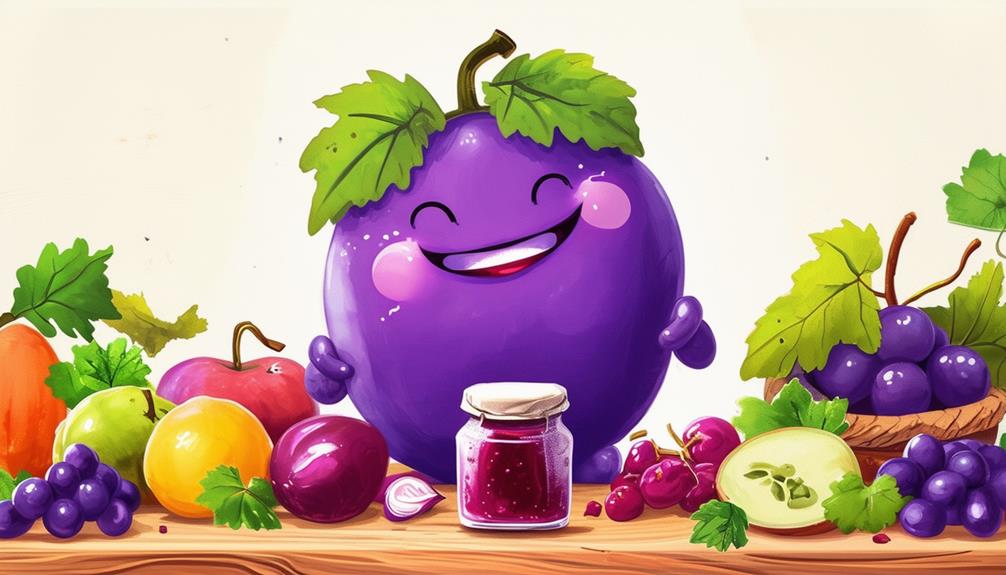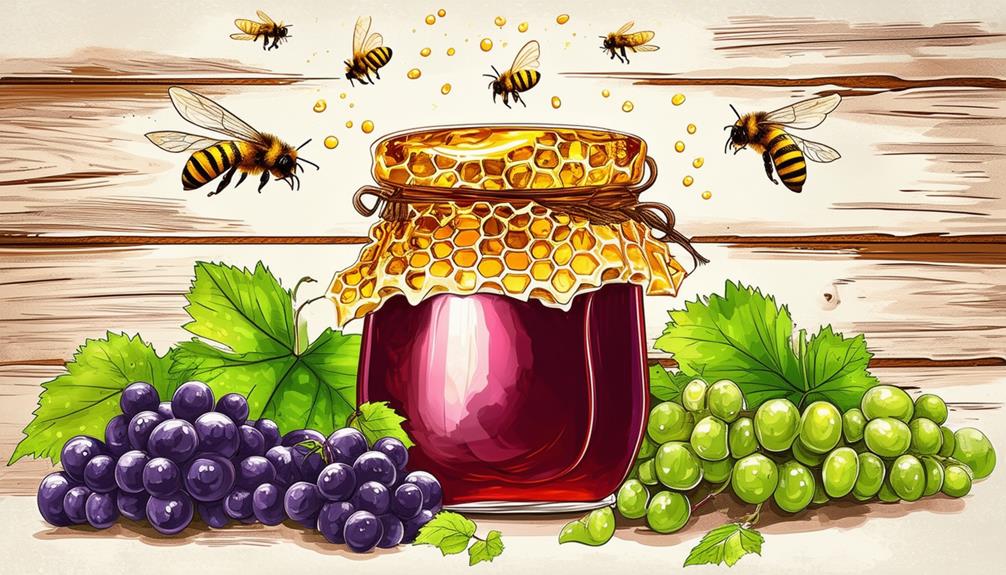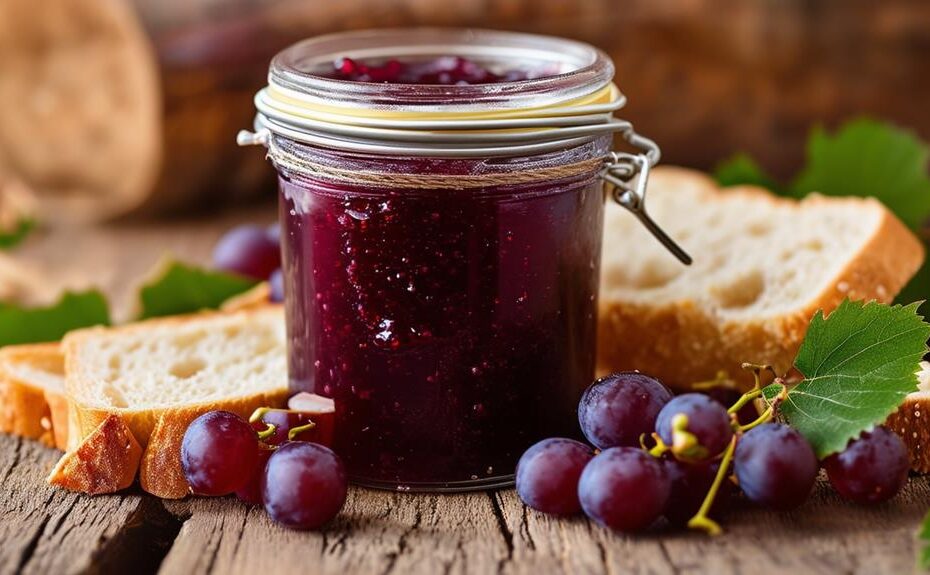You're probably wondering whether that jar of grape jelly in your pantry is vegan-friendly, and the answer is, it depends on the ingredients. Traditional grape jelly might contain non-vegan ingredients like honey, gelatin, or carmine. However, many vegan grape jelly options are available, made with plant-based sweeteners like stevia, natural gelling agents like pectin, and antioxidant-rich grape skin extract. Be sure to check the label for vegan-friendly certifications or ingredients. Delve deeper to explore what makes a grape jelly truly vegan and how you can make informed choices to support a sustainable and compassionate food system.
Grape Expectations Meet Veganism

As you venture into the world of veganism, you may find yourself pondering if your beloved grape jelly makes the cut. The good news is that vegan grape jelly is a thing, and it's a game-changer for those who prioritize ethical and health-conscious dietary choices.
Vegan grape jelly typically uses plant-based gelling agents like pectin or agar powder, making it a great alternative to traditional grape jelly.
Take, for instance, Good Good's vegan-friendly Concord Grape Jelly, which is sweetened with stevia and erythritol. This jelly isn't only delicious but also provides a guilt-free indulgence for those who care about animal welfare and the environment.
By choosing vegan grape jelly, you're supporting a more sustainable and compassionate food system. Plus, vegan jams and jellies often use natural sweeteners or rely on the natural sweetness of fruits, making them a healthier alternative to traditional options.
Grape Jelly's Hidden Ingredient
As you investigate the world of vegan grape jelly, you might be wondering what makes it so unique.
Let's take a closer look at the essential ingredients that set vegan grape jelly apart from its traditional counterparts.
Specifically, you'll find that Concord, Muscadine, and Scuppernong grapes, along with Rich Grape Skin Extract, play a vital role in creating that signature flavor and texture.
Concord, Muscadine, and Scuppernong
As you investigate the world of grape jelly, you might wonder what makes it so deliciously complex. The answer lies in the hidden ingredients, specifically the Concord, Muscadine, and Scuppernong grapes used in its production.
Let's take a closer look at three key points that can affect the vegan status of grape jelly:
- Flavonoid-Rich Grape Skin Extract,
- Pectin From Citrus Peel,
- Grape Seed Oil Incorporation.
Flavonoid-Rich Grape Skin Extract
You might be surprised to learn that grape skin extract, particularly from Concord, Muscadine, and Scuppernong grapes, is packed with flavonoids, powerful antioxidants that have been shown to promote heart health, reduce inflammation, and even exhibit anti-cancer properties.
As a vegan, you'll be happy to know that these flavonoids can support your general health and well-being.
Pectin From Citrus Peel
Deriving pectin from citrus peel, a common practice in grape jelly production, might raise some eyebrows among vegans. You might wonder, what's the connection between citrus and grape jelly? Here's the deal: citrus peel is a rich source of pectin, a natural gelling agent that helps achieve grape jelly's smooth texture.
| Source | Pectin Content |
|---|---|
| Orange Peel | High |
| Lemon Peel | High |
| Grape Skin | Moderate |
| Citrus Peel (combined) | Very High |
As a vegan, it's crucial to contemplate the origin of pectin in your grape jelly.
Grape Seed Oil Addition
Your grape jelly's ingredient list mightn't reveal a surprising inclusion: grape seed oil, which is extracted from grape seeds, not commonly used in grape jelly recipes, but might be lurking in certain types of jelly.
Check the labels, as Muscadine and Scuppernong jelly may include grape seed oil for added flavor and health benefits, making it non-vegan.
Rich Grape Skin Extract
As you investigate the world of grape jelly, you'll find that Rich Grape Skin Extract is a crucial element in giving it that distinctive flavor and color.
But what makes this extract so important? Let's take a closer look at three key components:
- Rich Grape Skin Anthocyanins,
- Grape Seed Oil Extract, and
- Grape Seed Oil Refined – each playing an essential role in enhancing the jelly's nutritional profile and taste.
Rich Grape Skin Anthocyanins
You may not know that grape jelly's rich grape skin extract is packed with anthocyanins, powerful antioxidants that offer a multitude of health benefits.
These antioxidants can reduce inflammation, improve heart health, and even have anti-cancer properties.
As a vegan, you'll be happy to know that grape jelly with rich grape skin extract can be a nutritious supplement to your diet, thanks to its high antioxidant content.
Grape Seed Oil Extract
Grape seed oil extract, a hidden ingredient in grape jelly, packs a punch with its rich antioxidant properties, particularly proanthocyanidins, which have been shown to reduce inflammation and improve circulation.
You might be surprised to learn that this extract comes from grape seeds, not jelly, and is often used in skincare products for its antioxidant benefits.
Grape Seed Oil Refined
This refined grape seed oil, extracted from grape seeds, boasts an impressive nutrient profile that sets it apart from its unrefined counterpart. Rich in antioxidants and healthy fats, it's a popular choice for skincare and cooking.
The refining process removes impurities, enhancing the oil's quality and making it perfect for nourishing your skin or adding flavor to your dishes.
Honey in Grape Jelly

As you investigate the ingredients in grape jelly, you'll want to pay close attention to the sweeteners used.
You might be surprised to find that some grape jellies contain honey, which, as you know, isn't vegan.
Next, let's examine how honey compares to other common additives like gelatin in fruit preserves and gelatin in grape jelly.
Gelatin in Fruit Preserves
As you examine the ingredients of grape jelly, you'll want to watch out for more than just gelatin. You'll also need to take into account other non-vegan ingredients that might be lurking in your favorite fruit preserves. Here are three more points to add to your radar:
- Carmine from crushed beetles,
- Carmine cochineal insect dye, and
- Beeswax in fruit coatings.
Carmine From Crushed Beetles
You might be surprised to learn that some grape jellies owe their vibrant red color to carmine, a food dye derived from crushed cochineal insects.
This means some grape jellies are non-vegan due to carmine, a red food colorant.
As a vegan, be cautious when selecting grape jellies to avoid those containing carmine from crushed beetles.
Carmine Cochineal Insect Dye
What's lurking in your grape jelly that might make it non-vegan? You might be surprised to find carmine cochineal insect dye, derived from scale insects, in some grape jellies.
Moreover, some grape jellies contain honey as a sweetener or gelatin in traditional fruit preserves, making them non-vegan.
Always read labels carefully to make sure you're getting a vegan-friendly grape jelly.
Beeswax in Fruit Coatings
When you peel back the label, you might find that beeswax is lurking in the fruit coatings of grapes used to make your grape jelly. This non-vegan ingredient can sneak into your jar.
Furthermore, some grape jellies may contain honey as a sweetener, which isn't vegan either.
As a vegan, it's important to check labels for these hidden ingredients to make sure your grape jelly is plant-based.
Gelatin in Grape Jelly
When examining the ingredients in grape jelly, you'll want to pay attention to the sweet stuff. Specifically, you'll want to check for refined sugar syrups, cane sugar syrups, and bone char filtered sugar, which can be non-vegan due to the filtering process.
Here are some points to keep in mind:
- Refined Sugar Syrup,
- Cane Sugar Syrup, and
- Bone Char Filtered Sugar, which may have implications for vegans.
Refined Sugar Syrup
You might be surprised to learn that some grape jelly brands use refined sugar syrup, a sweetener that's not always vegan-friendly. This non-vegan ingredient can sneak its way into your jelly, making it important to check those ingredient labels.
Opt for vegan grape jellies sweetened with natural sweeteners like stevia to guarantee vegan suitability.
Cane Sugar Syrup
Traditional grape jelly recipes often rely on cane sugar syrup for sweetness, but beware: some manufacturers may slip in honey or gelatin, rendering the product non-vegan. Always check the ingredient list to confirm the product is vegan-friendly. Here's a breakdown of what to look for:
| Ingredient | Vegan? | Description |
|---|---|---|
| Cane Sugar Syrup | A common sweetener in grape jelly | |
| Honey | An animal byproduct, non-vegan | |
| Gelatin | Derived from animal collagen, non-vegan | |
| Pectin | A plant-based gelling agent, vegan | |
| Agar-Agar | A plant-based gelling agent, vegan |
Bone Char Filtered Sugar
When scanning the ingredients list, don't overlook the sugar – some grape jellies may use bone char filtered sugar, which can be a major red flag for vegans.
This non-vegan ingredient can make your grape jelly unsuitable for a vegan diet.
Always check the label to confirm the sugar used is vegan-friendly, guaranteeing the grape jelly's vegan suitability.
Carrageenan From Seaweed Sources
Grape jelly manufacturers may incorporate carrageenan, a seaweed-derived ingredient, to improve the jelly's texture and stability.
You'll be happy to know that carrageenan is vegan-friendly, sourced from seaweed sources.
This plant-based gelling agent is commonly used in vegan foods, making it a great enhancement to vegan grape jelly.
As you scan the label, look for carrageenan as a sign that the grape jelly is likely vegan.
Grape Skin Extract Matters
Incorporating grape skin extract into your daily routine can greatly boost your antioxidant intake, thanks to its abundant concentration of resveratrol.
As you delve into the world of grape jelly, understanding the importance of grape skin extract is vital. When it comes to Concord Grapes, the skin of this fruit contains a higher concentration of beneficial compounds compared to the flesh. This means that grape skin extract is packed with antioxidants, which can have a positive impact on your overall well-being.
As a vegan, it's important to take into account the vegan status of grape skin extract. Fortunately, grape skin extract is a plant-based ingredient, making it a suitable addition to a vegan diet.
The antioxidants present in grape skin extract, particularly resveratrol, have been linked to potential anti-inflammatory and heart-protective properties. Studies suggest that consuming grape skin extract may help lower blood pressure and improve cardiovascular health.
Frequently Asked Questions
Can Vegans Eat Grape Jelly?
You're wondering if you can indulge in grape jelly as a vegan. Good news! You can enjoy vegan grape jelly made with plant-based ingredients like pectin and natural sweeteners, avoiding animal-derived ingredients.
Is Welch's Concord Grape Jelly Vegan?
You're wondering if Welch's Concord Grape Jelly is vegan, but it contains high fructose corn syrup, which might be a concern for some vegans due to processing methods, so it's up to you to decide.
What Jelly Is Vegan?
You're looking for vegan jelly options, and luckily, many brands now offer plant-based alternatives. Good Good's vegan grape jelly is a great choice, sweetened with stevia and erythritol, making it a healthy and ethical pick.
Is Smucker's Jelly Vegan?
You're wondering if Smucker's jelly is vegan, and the answer is, it depends. While it contains vegan-friendly pectin and citric acid, the high fructose corn syrup might be a deal-breaker for some vegans, so you decide.
Conclusion
So, is grape jelly vegan? Unfortunately, it's not always a yes. Some grape jellies contain honey, which is an animal byproduct. Even if they don't, grape skin extract might be used, which can be filtered using animal-derived products.
However, many brands offer vegan-friendly grape jelly options. Always check the ingredients and labels to make sure the jelly aligns with your dietary choices. By being mindful of these hidden ingredients, you can enjoy your grape jelly while staying true to your vegan lifestyle.
